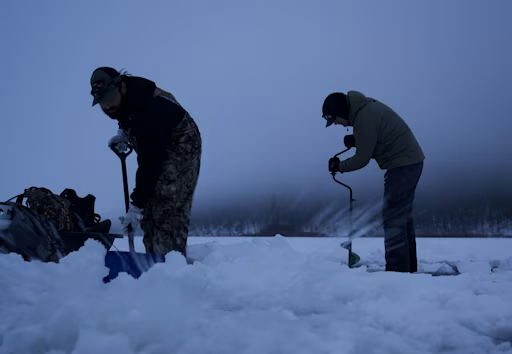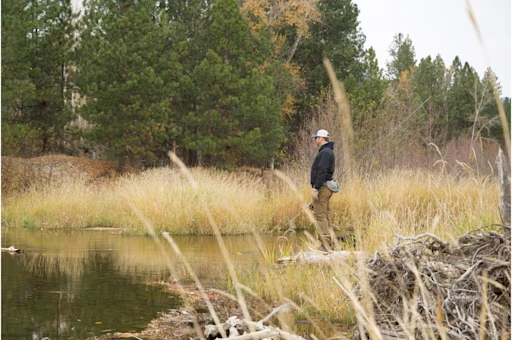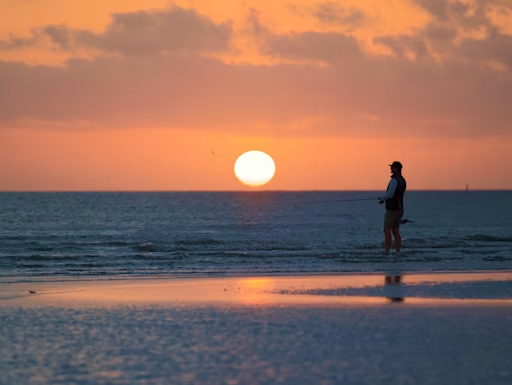Common fishing injuries
Fishing is our gateway into the outdoors. It’s a passion that gives us fresh air, exercise and memories to last a lifetime, but it's not always safe. The dangers involved in fishing aren't as extreme as whitewater kayaking, or free climbing, but there are some injuries that you can look out for and prevent.
Share this article

Fishing is our gateway into the outdoors. It’s a passion that gives us fresh air, exercise and memories to last a lifetime, but it's not always safe. The dangers involved in fishing aren't as extreme as whitewater kayaking, or free climbing, but there are some injuries that you can look out for and prevent.
As an EMT, wilderness first responder and guide for five years, I’ve seen a fair number of outdoor injuries. Below are some of the most common fishing/water related injuries you can learn from and prevent and surprisingly they aren’t all hook related.
Falls, spills, sprains and breaks

For those who fish from the comfort of a boat, or raft, you may (rightfully) be most worried about drowning, but the highest percentage of injuries on a river come from getting in and out of the boat. I’ve seen a broken leg and plenty of sprained ankles from people losing their balance on the uneven river bank.
Rocks, mud and sea legs, from sitting in a boat for too long, all contribute to entrance and exit spills. To prevent these types of falls, always make sure to wear some type of hard bottomed footwear, preferably with a closed toe. You need to also use the sides, tubes, or gunnels of your boat to properly balance as you get in or out.
A rule of thumb is to never jump out of the boat, because you don't know what is just under the surface of the water. Plus the force of jumping can push the boat back, throwing your balance off.
Is it cold out here, or just me

Hypothermia is a real problem for most fishing endeavors. Mountain storms, ocean squalls and other weather events can leave an angler soaked to the bone in moments. Hypothermia can set in within minutes on cold days, especially with wind. Anglers offshore, or drifting rivers, are particularly susceptible to hypothermia as they cannot readily escape their situation.
The first signs of someone suffering from hypothermia are what’s known as the “umbles” an angler will start with the grumbles, then they may start slurring their words into mumbles and their ability to walk will then suffer as they suffer from stumbles. It's imperative for fellow anglers to be on the lookout for these signs when fishing cold weather.
Rain gear is an essential item for all anglers, especially when spring, or fall fishing. A waterproof jacket will keep your clothes from getting soaked, prevent your body temperature from dropping and protect you from wind. Wind plus wet clothes, or skin can be a dangerous combination as wind will pull the heat away from your body and lower your core temperature much faster.
For any day on the water it's important to remember the adage, cotton kills. This means you should always wear quick drying clothes that don't hold moisture like cotton does, like the kind found here.
Keep your head above water

Many states require you to have a PFD, or personal flotation device, in the boat while fishing. This is a great idea, except they don’t require you to be wearing the PFD. Accidents can happen without warning where there is no time to grab your PFD, and when you need it, but don't have it, it's already too late.
It doesn't take much water to drown in and it doesn’t take class five rapids for someone to get into trouble.
According to the Food and Agriculture Organizations of the United Nations, thousands of anglers drown every year. Many of these accidents could be prevented with a proper PFD.
Any angler going onto open water should wear, at least, a class 3 rated PFD. This is especially true for anyone fishing moving water. Along with PFDs on board and being worn, anglers should also carry throw bags, for retrieving anyone overboard who can’t swim back, and be certified in CPR.
Make sure and check out the Fishbrain Shop for a full array of PFDs and safety gear.
Unfortunate hook sets

This is probably the category everyone thought of when looking at the headline, especially those of you who fish with kids. Who would have ever thought that flinging razor sharp hooks through the air could be dangerous? Throw a barb on those hooks and you really have a recipe for a good time.
Ears, hands, noses and just about any other surface on your body are all susceptible to an unplanned piercing. This is why it's so important to practice your cast, be incredibly aware of your surroundings and know how to perform basic hook removal.
Most hooked body part incidents are minor and can be handled on site. A pair of needle nose pliers, cutting dykes, or a leatherman are important tools and often already found in tackle boxes. If a hook hasn’t passed all the way through the skin, its possible to fish it out. If the hook goes through, past the bard, though, you may need to use an above tool to clip the eye of the hook and push the rest clean through.
Sunglasses can be used to not only protect your vision from UV rays, but as the perfect eye protection from flying hooks, also. Don't even think of messing with a hook when it's in, or even near, an eye.
Other areas of concern are hooks embedded near vital areas, like the neck, wrists, under arms, or anywhere else where major arteries set.
The severity of the situation can also be dependent on the size of your hook. Trout anglers have a much better chance of avoiding the emergency room than if someone is chucking a shark hook.
If you have any doubt on the severity of a hooked body part, don't take any chances and see a doctor promptly.
We all love fishing and it is one of the best outdoor activities ever invented. We love fishing solo, we love fishing with friends and even (certain) family members. That doesn’t mean the sport is without its dangers though.
We encourage every angler to practice safe angling whenever possible. This means know your rules, know where you’re fishing and never skimp on the appropriate knowledge and gear.
For safety reasons, we also recommend not fishing with that one friend who is always yelling, “hey y’all watch this.”
Now let’s go fishing.
If you haven't experienced the #1 fishing app worldwide, make sure and check out Fishbrain to see all the fish data, fishing spots, weather conditions you've been missing out on plus much more.

Download the Fishbrain app and access the best fishing spots in your area
Related blog posts
Discover the best spots, techniques, and gear for successful fishing in urban areas and city waters on Fishbrain.

Master the hardwater season with advanced ice fishing tips . Learn how to find fish faster, refine your search and adjust presentations to catch more fish all winter long.

Your guide to Victoria’s best fish to catch in rivers, lakes, and coastal waters. Learn prime species, fishing tips, and key regulations




